新编英语教程.ppt
演示文档新编英语语法教程6-7Determiners.ppt
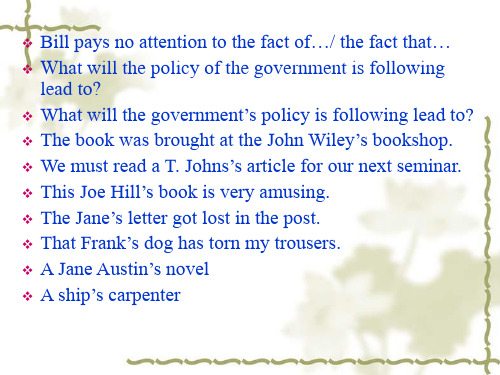
❖ 4. That long report of Mr. Allen’s has been…
❖ 5. Those new shoes of yours…
❖ 6. I have read the article of the student who…
❖ AABDB CCCDB ACABC DBDCD
Determiner
1. Determiners vs. Premodifiers
2. Articles 3. Collocations between
determiners
What’s the pattern of a noun phrase?
❖ 11. The government demanded the enemy’s unconditional surrender/ the unconditional surrender of the enemy.
❖ 12. Bill paid no attention to other people’s criticism of him. ❖ 13. The government has paid great attention to the younger
generation’s education/ the education of the younger generation. ❖ 14. The book was bought at John Wiley’s, the bookseller’s. ❖ 15. We must read an article of T. Johns’s for our next seminar. ❖ 16. What will this policy of the government’s lead to? ❖ 17. This is an idiot’s tale. ❖ 18. That dog of Frank’s… ❖ 19. This book of Joe Hill’s… ❖ 20. Jane’s letter…
新编英语教程(第三版)第一册第七课课件

新编英语教程(第三版)第一册
Unit 7 Cycling
Lead-In
LSP
Dialogue
Role Play
Reading
Exercises
Buy N Large: a fictitious huge company that dominates all business of the world in the film Wall-E.
Preparatory Questions LSP I LSP II
LSP III LSP IV
新编英语教程(第三版)第一册
Unit 7 Cycling
Lead-In
LSP
Dialogue
Role Play
Reading
Exercises
Language Structures
1. Do you know what to say to a person on his birthday in English?
新编英语教程(第三版)第一册
Unit 7 Cycling
Lead-In
LSP
Dialogue
Role Play
Reading
Exercises
Wall-E: John: Wall-E: John:
Eva. No. John. Eva. Bye, Wall-E.
新编英语教程(第三版)第一册
Unit 7 Cycling
新编英语教程(第三版)第一册
Unit 7 Cycling
Lead-In
LSP
Dialogue
Role Play
Reading
Exercises
momentarily: very soon
《新编英语语法教程》PPT课件
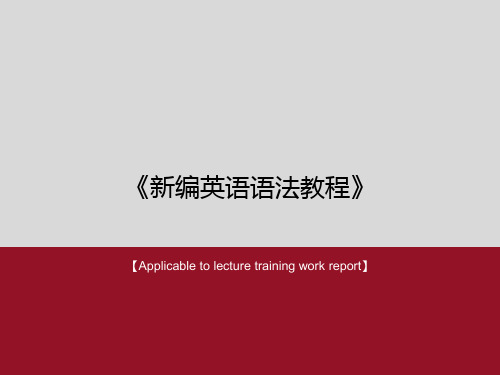
Special lecture notes
Ù 6.月球上没有水。
Special lecture notes
Ù A: There is no water on the moon.
Ù 7. 夏威夷气候从来不冷. Ù A: It is never cold in Hawaii.
Ù 8. 在巴黎,五月份天气并非总是美好;有时多雨。 In Paris, the weather is not always nice; it rains a lot
的从句当中
Ù They were leaving a few days later.
Ù He told me to wake him up if he was sleeping. Ù 4) 表示现在时间和将来时间里的动作 Ù A) 委婉的语气
Ù I was wondering if you’d like to come out with me. Ù B) 主观臆想
Ù I hear poor old Mrs Yang has lost her son.
Ù 附特殊用法: Ù A) 表达某种情绪
Special lecture notes
Ù I happen to drop in on her once and you make such an issue of it.
Ù A:
Ù 15. 星M期y p日ar我ent父s se母ldo很m少go去to做ch礼urc拜h o.n Sunday.
Ù A: Ù 16. 地T球he 围Ear绕th太mo阳ve转s ar.ound the Sun.
Ù A:
India lies to the south of China.
18. 泰晤士河流经伦敦。
新编实用英语综合教程1第五版第二单元课件

新编实用英语综合教程1第五版第二单元课件New Practical English Comprehensive Course 1 Fifth Edition Unit 2 PPTUnit 2: Hobbies and InterestsPart I: Vocabulary1. Hobbies- Definitions and examples of different hobbies (e.g. gardening, reading, painting, cooking, etc.)- Phrases and expressions related to hobbies (e.g. spend time on, take up, be interested in, etc.)2. Interests- Different types of interests (e.g. sports, music, movies, travel, etc.)- Ways to talk about one's interests (e.g. I'm passionate about, I enjoy, I'm a fan of, etc.)Part II: Grammar1. Present Simple vs. Present Continuous- Explanation of when to use present simple (e.g. routine activities, general truths) and present continuous (e.g. actions happening now, future plans)- Practice exercises to help students differentiate between the two tenses2. Adverbs of Frequency- Examples of adverbs of frequency (e.g. always, often, sometimes, never)- How to use adverbs of frequency in sentences (e.g. I rarely go to the gym, She usually walks to work)Part III: Speaking1. Talking about Hobbies- Pair work activity where students discuss their hobbies with a partner- Questions to guide the conversation (e.g. What hobbies do you have? How often do you do them?)2. Sharing Interests- Group discussion on different interests and why they are enjoyable- Encouraging students to find common interests with their classmatesPart IV: Listening1. Hobbies and Interests- Listening to a dialogue between two friends discussing their hobbies and interests- Comprehension questions to check understanding of the dialogue2. Famous People's Hobbies- Listening to a short passage about famous people and their hobbies- Matching exercise where students match the person with their hobbyPart V: Writing1. My Favorite Hobby- Writing task where students describe their favorite hobby in detail- Focus on using adjectives, adverbs, and descriptive language to make their writing more engaging2. Future Plans- Writing about future plans related to hobbies and interests- Encouraging students to use future tenses to talk about what they will doOverall, the Unit 2 PPT of the New Practical English Comprehensive Course 1 Fifth Edition provides a comprehensive overview of hobbies and interests, helping students improve their vocabulary, grammar, speaking, listening, and writing skills in English. Students will have the opportunity to learn new vocabulary, practice grammar structures, engage in speaking activities, listen to authentic dialogues, and express themselves through written tasks. The diverse range of activities and exercises ensure that students develop a well-rounded understanding of the topic and can confidently talk about their hobbies and interests in English.。
新编英语语法教程PPT课件
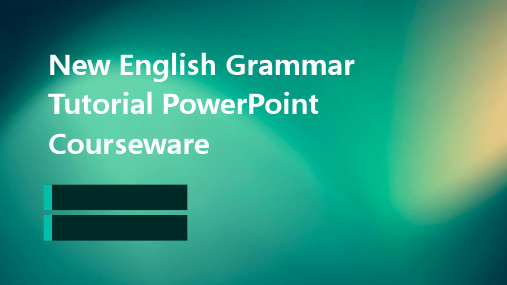
a word or phrase that describes or limits the meaning of another word in a sense
Sense and voice
Sense
indicates when an action or state occurs (past, present, or future)
Introduce clauses that modify nouns or pronouns (e.g., "who," "which," "that")
Used to ask questions about nouns or pronouns (e.g., "who," "what," "which")
Voice
indicates which subject of the presence performs the action (active voice) or receives the action (passive voice)
Subjunctive mood
Subjunctive mood
03 Nouns and Pronouns
Types and Usage of Nouns
Generic names for people, places, or things (e.g., "dog,"
"city")
Co mm on No uns
Refer to ideas, concepts, or qualities
Background
新编英语教程(第三版)第一册第五课课件
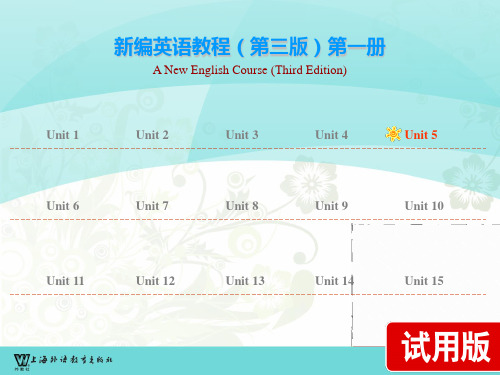
A New English Course (Third Edition)
Unit 1
Unit 2
Unit 3
Unit 4
Unit 5
Unit 6
Unit 7
Unit 8
Unit 9
Unit 10
Unit 11
Unit 12
Unit 13
Unit 14
Unit 15
Unit 5 Save Our Heritage
新编英语教程(第三版)第一册
Unit 5 Save Our Heritage
Lead-In
LSP
Dialogue
Role Play
Reading
Exercises
Language Structures Preparatory Questions Practice I
Practice II Practice III
新编英语教程(第三版)第一册
Unit 5 Save Our Heritage
Lead-In
LSP
Dialogue
Role Play
Reading
Exercises
docent: (AmE) someone who guides visitors through a museum, church, etc.
新编英语教程(第三版)第一册
Unit 5 Save Our Heritage
Lead-In
LSP
Dialogue
Role Play
Reading
Exercises
riffraff: an insulting word for people who are noisy, badlybehaved, or of low social class e.g.: Don’t bring any riffraff into my house! 别把不三不四的人领到我家来!
新编英语教程第三版2Unit2ppt课件
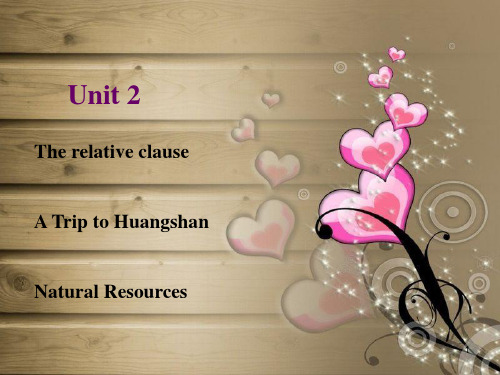
3. 如果关系代词紧跟在介词后面,不能用who或 that, 只能用which 或whom。
4. 在非限从句中,不能用that, 做宾语的代词也不可 省略。
Go for a short walk, usu. After you have been sitting down for a long time.
Office workers need to stretches their legs from time to time because their working style is too sedentary.
The internet affords convenience to many. (给予,供给)
10Leabharlann in session: not on vocation 不在休假期; assembled for business 开庭,开会
Are American universities in session during August? The court is now in session.
18
19
Yellowstone National Park is the United States' — and the world's — first national park, established by the US Congress on March 1, 1872. Covering over 2.2 million acres/899,000 hectares, the park is larger than the states ofRhode IslandandDelawarecombined. There are nine visitors centers and museums, nine lodging facilities hosting a total of more than 2,000 rooms, more than 2,000 camping sites, about 50 picnic areas and a marina.
外教社新编英语语法教程(第6版)PPT课件Unit 22
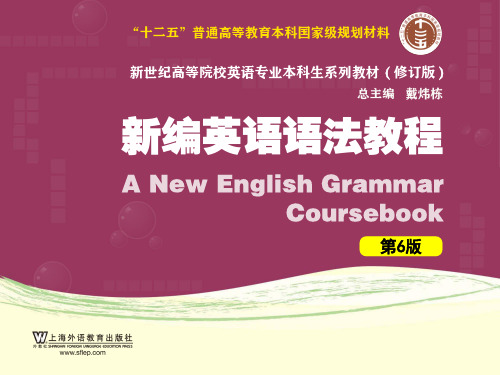
重难点解析
22.0 -ing分词 22.1-ing分词与 22.2 既能直接带不定式又 22.3 -ing 的形式及用法 动词的搭配关系 能直接带-ing分词的动词 分词分句
They plan to plant the area with grass and trees.
重难点解析
22.0 -ing分词 22.1-ing分词与 22.2 既能直接带不定式又 22.3 -ing 的形式及用法 动词的搭配关系 能直接带-ing分词的动词 分词分句
2 能带不定式和-ing分词而意义不同的动词
e.g. We’re considering buying a new car. He denied having been there. We appreciate your inviting us to your party. She can’t stand being kept waiting.
1. remember / forget / regret等动词 + -ing分词:先于主句动词的动作 + 不定式:后于主句动词的动作
e.g. I remember posting the letter. (“寄信”先于“记得”) I remembered to post the letter. (“寄信”后于“记得”)
提示 would like意思是wish或want,后面永远接不定式,如“What would you like to do tomorrow?”。
- 1、下载文档前请自行甄别文档内容的完整性,平台不提供额外的编辑、内容补充、找答案等附加服务。
- 2、"仅部分预览"的文档,不可在线预览部分如存在完整性等问题,可反馈申请退款(可完整预览的文档不适用该条件!)。
- 3、如文档侵犯您的权益,请联系客服反馈,我们会尽快为您处理(人工客服工作时间:9:00-18:30)。
1. It turns out you can “enquire” about nearly anything…— It happens that you can ask about almost anything…
Turn out meaning “happen to be, or be found to be” is usually followed by a noun or an adjective. It may also be followed by a that clause.
Teaching Tasks and Process
I. Pre-rw do you think of the internet. Is it conducive or detrimental to university students as well as to the whole society?
Be cautious about what kind of business firms you deal with (do business with).
6. keep track of all the random associations one comes across…
Keep track of means “keep oneself informed about something” or “pay attention to something so that one knows what is happening.”
Examples:
Of all places, they went vacationing in an unknown village.
Of all things, she bought an ordinary bowl as a souvenir.
I can’t understand why she, of all people, should speak to us about how to use the computer.
4. It started, of all places, in the Swiss Alps.
Of all places, of all things, or of all people are used to suggest that a particular place, thing, or person seems surprising or unlikely when there are many other places where something might happen, many other things which might be expected to be done, or many other people who might be present or be doing something.
Examples:
Mark is very smart. He can deal with (handle) all kinds of difficult situations.
Recently I read an article which dealt with (concerned / was concerned with) the latest developments in computer science.
He was whiling away his time by putting down some random thoughts on paper.
At random is used adverbially. Examples:
It turned out that the unexpected visitor was one of my mother’s former students.
2. …access to the Internet— the opportunity to use the Internet. Access meaning “the means or opportunity or right to use or see something” is followed by the preposition to.
Examples:
We gave Wang credit for his remarkable achievements in biotechnology.
Tim Berners-Lee should be given credit for the creation of WWW.
Credit should go to Frank for the team’s success.
Example:
We read newspapers every day to keep track of current events.
The opposite of keep track of is lose track of. Example:
We’ve lost track of him since he left Shanghai for home.
Me: … Then I said: Hello, uncle.
The internet itself is of no harm nor benefit. It is the uses to which it is applied that determine its value.
III Language points
5. … that dealt with information in a “brainlike” way —that handled information in the way as the brain does. Deal with is used in different ways with different meanings.
Me: My God! You asked your father this kind of thing? You surely don’t have your own definite idea!
Jiaojiao: It’s not like that. I am just 5 years old and haven’t learnt to type. It is my father who types for me.
… Recalling the painful experience, I still have two girls to chat with.
Me: Girl, let’s fall in love!
Lonely girl: Good. After all, I can fall in love. Me: Well, didn’t you love someone before? Lonely girl: No. They always said I was a dinosaur. Me: Umm, in this case, we’d better break up at the moment. Lonely girl: No, I don’t agree. It’s my first love… 55555555555… Now the last girl left, I would especially cherish her. Me: Girl, don’t you want to fall in love with me? Jiaojiao: I think it’s OK, but I’d like to ask for my father’s advice.
Me: Honey, let’s fall in love!
Talented girl: OK. Are you a Party member? Me: No, I’m not. Talented girl: Are you a League member? Me: Well, no. Talented girl: Well, are you a member of China Young Pioneers?
Me: I used to be one many years ago. But why do you bother asking such questions?
Talented girl: Then I can’t promise you. At all events, I’m the team leader of our class.
Random means “unplanned, unintentional, aimless, purposeless, etc.”
Examples:
While everyone was discussing the question seriously, John made a few random remarks now and then.
新编英语教程4
For your promising future
Unit Five
Objectives
1. to get familiar with ways of making introduction to a celebrity.
2. to grasp the usage of the words such as turn out to be, access and cash in on.
Examples:
In a university library, we have access to large numbers of academic books.
